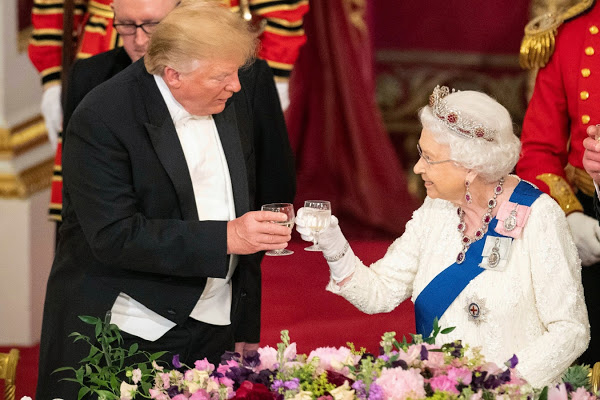On politics, Queen Elizabeth II may have many thoughts, but none of them are supposed to be public. Strict neutrality is what is expected of her.
That has made the queen’s words perhaps also some of the world’s most scrutinized. It is safe to assume that no wording in her public speeches is a coincidence, including her address Monday night at a banquet for President Trump.
In a speech that was otherwise praised by British commentators for being diplomatic and neutral, the queen did not shy away from a topic that under different circumstances would have seemed normal to address, but that has become politically charged under Trump: international institutions, designed to preserve peace.
Trump gets a banquet with the queen and the good china on state visit to U.K.
“After the shared sacrifices of the Second World War, Britain and the United States worked with other allies to build an assembly of international institutions, to ensure that the horrors of conflict would never be repeated,” the queen said.
“While the world has changed, we are forever mindful of the original purpose of these structures: nations working together to safeguard a hard-won peace,” she said.
Jochen Bittner, a German contributing writer to the New York Times, wrote for German weekly Die Zeit that “one can hardly read the queen’s remarks at the banquet with Trump in a different way than as a commitment to NATO as well as the E.U.”
The queen did not explicitly name the institutions she was talking about, but the two global bodies established after World War II to prevent a similar conflict from happening again were the United Nations, NATO and later — on a regional level — the European Union. Some observers immediately suspected a subtle rebuttal to Trump, who has been accused of acting to weaken those organizations.
Trump has criticized what he called “the utter weakness and incompetence of the United Nations” and stated that the body is not “a friend of freedom, it’s not a friend even to the United States of America where, as you know, it has its home.” The United Nations scrambled to fill a budget hole late last year, after the Trump administration slashed its financial contributions to U.N. peacekeeping operations by about $220 million.
Asked about the queen’s comments, Trump confidant Christopher Ruddy, the CEO of Newsmax, said Monday evening on CNN: “I believe Donald Trump agrees totally with that.”
“He went in and he said I don’t want to disband NATO. That’s one of the structures that she’s talking about that came out of World War II.” Ruddy suggested Trump was merely demanding that other NATO members pay more.
But apart from striking more conciliatory tones at times, Trump has raised bigger questions in the past over the future of the alliance, including in an interview with Fox News in July, in which he was asked by host Tucker Carlson: “Why should my son go to Montenegro to defend it from attack?” Trump responded: “I understand what you’re saying; I’ve asked the same question. You know, Montenegro is a tiny country with very strong people. . . . They are very aggressive people. They may get aggressive, and congratulations, you’re in World War III. But that’s the way it was set up. Don’t forget, I just got here a little more than a year and a half ago.”
NATO was created in 1949 to prevent possible Soviet attacks on the United States, Canada and a number of Western European nations. If one member is attacked, all NATO countries are required to rush to its defense.
Even though the Soviet threat is long gone and the United States spends more on defense than any other NATO member, the military alliance’s supporters argue that the benefits outweigh the costs.
Trump, however, has lashed out at other members, such as Germany, for spending less on defense per capita than the United States does. Those tensions escalated in summer 2018, when even the breakup of the alliance appeared no longer impossible.
When foreign leaders of U.S. allies wanted to offer veiled rebuttals to Trump in the past, they resorted to stressing multilateralism and the importance of international institutions. German Chancellor Angela Merkel once again did so at the Munich Security Conference this year, after she and French President Emmanuel Macron made similar remarks in Paris in November at a meeting that Trump had shunned.
The queen’s speech Monday may have — deliberately or not — included similar references to such institutions, but her overall message was far more diplomatic: Let’s stick together.
“Mr. President, as we look to the future, I am confident that our common values and shared interests will continue to unite us. Tonight we celebrate an alliance that has helped to ensure the safety and prosperity of both our peoples for decades, and which I believe will endure for many years to come,” she said.




